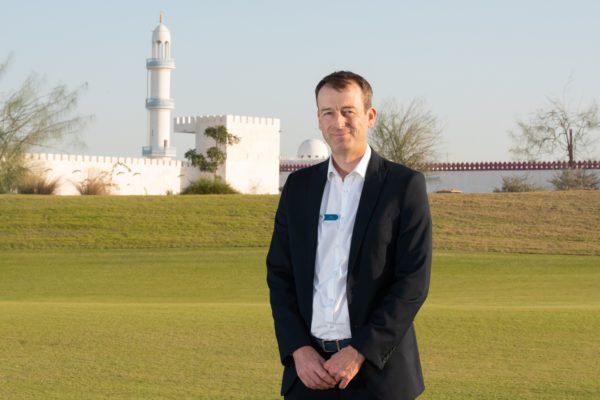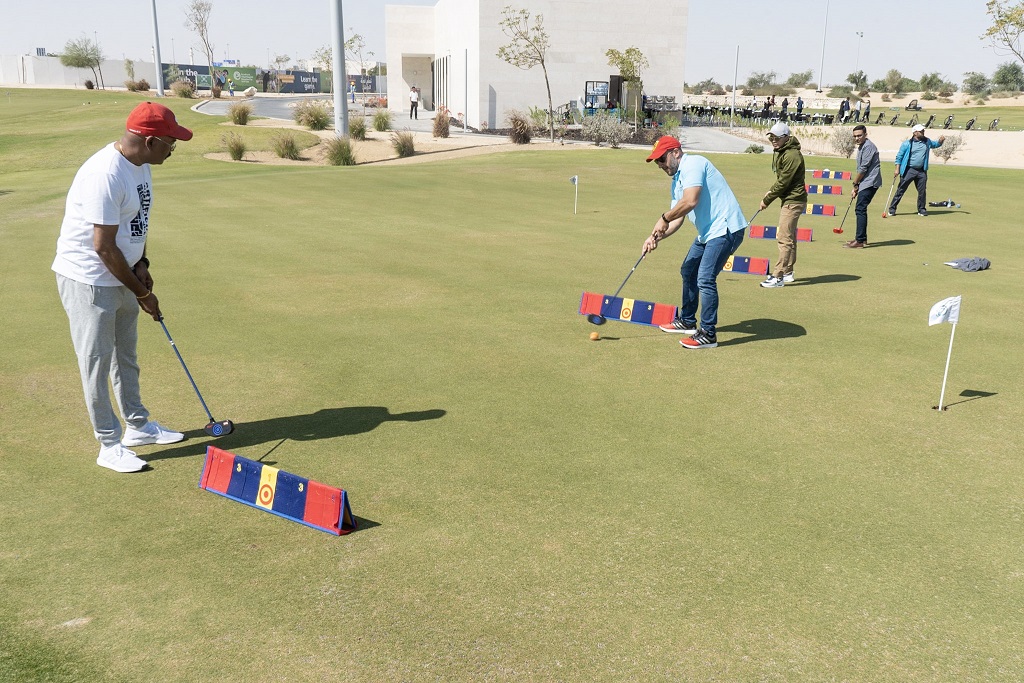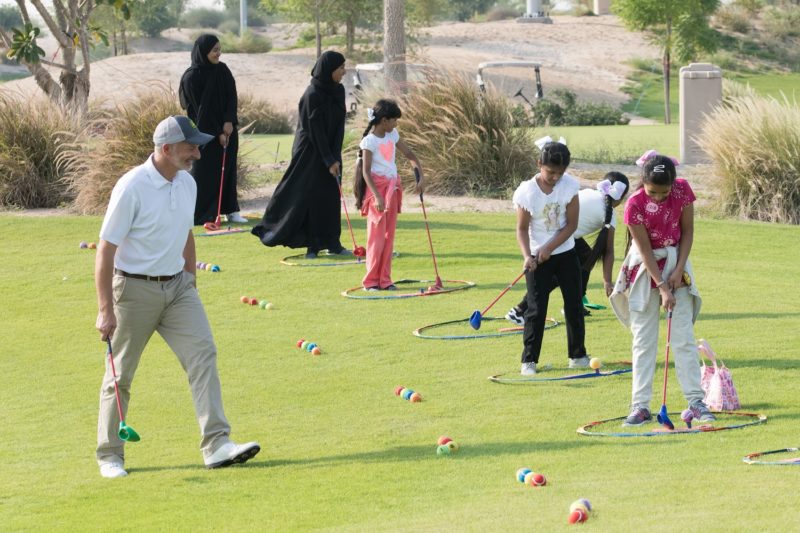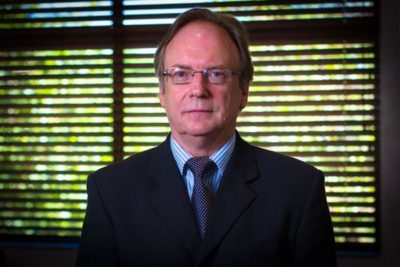Michael Braidwood, GM of Education City Golf Club in Qatar, in conversation with our series moderator and host John Cockayne
Michael Braidwood career summary

Mike Braidwood, who is a member of the PGA of Great Britain & Ireland, has had an eclectic career since being one of the resident golf professionals at the iconic Gleneagles Hotel in Scotland.
In 1998 and after four years at Gleneagles, he moved to Bahrain and took on the role of general manager at the Riffa Views Golf Club, designed by fellow Scot Colin Montgomerie, which is about 20 minutes outside of Manama, the Kingdom’s capital.
During a restructuring at Riffa Views, Mike then took on the role of running the Bahrain International Golf Course Company as CEO, while also managing, as the club’s GM, the renamed Riffa Views which had become the Royal Golf Club Bahrein.
This experience prompted Mike’s next move to Braemar Golf Developments as the company’s operations director, where he oversaw the company’s clients’ interests at multiple venues across Europe and the Middle East.
Following his stint with Braemar, which has its HQ in St Andrews in Scotland, in 2014 Mike then took on the role Director of Education, Club Managers Association of Europe which has its office base at Ryton on Dunsmore, in Warwickshire, U.K.
However, it seems that the Middle East’s pull was felt again, because from 2017 Mike took on the challenging role of opening up and then managing the Education City Golf Club in Qatar as the club’s General manager.
Now we continue the discussion which began last Friday 21st June and continued on Friday 28th June and Wednesday 10th July
John Cockayne: I see that you can take the man out of Scotland, but you can’t necessarily take the lure of the Gulf out of the Scot! What drew you back in the Middle East this time – was it just the concept of Education City, the challenge of being in at the foundations of a project again, or perhaps a combination of both?
Michael Braidwood: As you know I have been working in this region for years, both in a client and support role with Braemar Golf Management and also in permanent roles and now here in Qatar.
I previously worked in the region from 1998 to 2010 in Bahrain as GM of Riffa Golf Club. I then continued as the CEO of the redeveloped club, the Royal Golf Club, as we did part of the Riffa Views development.
In 2010 I left Bahrain to allow my kids to do their secondary education in Scotland, now they are grown up I felt it time to have another Arabian adventure.
In my time away I did do some work in Oman and also through the Club Managers Association of Europe we did some education programmes in UAE, so I never lost touch with the region. I have to say though that in this phase the main lure was the scale and vision of the Education City project.

JC: Education City is obviously a very ambitious project. What are the key elements, in being part of a much broader vision, that will make this golf course’s initial phases different for you from the other projects you have been involved with and/or clubs that you have managed?
MB: The quality and range of the facilities is truly world class which makes Education City Golf Club an ambitious project with a lot of golf and related amenities that need to be activated.
The vision is to grow the game and in particular in some non-traditional golfer demographic sectors such as Arab men, ladies and children; this is going to be a huge educational process to sell the benefits of taking up the great game of golf and then sticking with it.
We are focusing on health and wellbeing at the club and putting in many programmes to engage people at the club and with the sport. Our corporate team building product is a prime example – we get corporate groups to come and work on exercises that relate to business acumen: strategy, teamwork, time management, decision making, communication and so on, with all of them using golf equipment and games.
This makes for a win: win – the consumer is getting the team building element and we are soft-selling golf
JC: In retrospect our challenge in Oman was to develop a real golfing culture and grow the number of Omani golfers. Of course, in truth, the challenge to bring new golfers into the game is a generic one that is common to all regions.
It seems that you are in pretty much the same position in Qatar as we were in Oman; I see that there are two grass golf clubs and two sand courses around Doha and the probability is that there are not enough local players although their numbers would in all probability be bolstered by the expat community. Is this about right?

MB: The picture is indeed very similar at macro level, so understanding the demographics and environment were key first steps, especially in terms of what those demographics like or expect. As mentioned earlier, we need to sell the benefits of why play golf? In combination with this we need to make the environment one that is conducive to the local culture.
We need to watch the ‘local rules’ so we shall not serve alcohol, making the club one that is truly for the family.
We do more lessons in groups, Arabs like to learn together, we are seeking out role models (influencers), working with schools and universities and we have ladies only nights. We need to make Qataris believe golf is a sport for them.
We have also been careful in the design too of the learning journey so as to make it as easy as possible.
There is a lot of tech available in our Centre of Excellence teaching school, a games lawn where families can enjoy the outdoors playing garden games where they can get comfortable with our surroundings and then maybe try golf. This mix is then complemented by a restaurant operator who is a favorite amongst the Qataris.
We are constantly challenging ourselves to find ways to make the sport appealing to the local population – the bottom line here being that they are potentially members for life whereas expats will come and go.
JC: One of the concerns in the business of golf is that we are slow to share our successes and failures. This could be in part to the culture (we tend to be a quiet ‘lot’ and don’t going around publicising our successes as effectively as perhaps we should) and that we tend to become very insular, or even blinkered at club level and only focused on our own immediate concerns.

Has your time in other countries helped formulate the right plans for Qatar and what have been the first steps on this journey?
MB: Rather like you I could never be accused of living the same year 30 times! So, yes, every role, job and country I have worked in has added another layer to my experience. I believe that the mix of roles and countries I have experienced helps to give a more rounded view of the challenges to be faced.
Just like the object of this discussion series, which is to share experiences and both failures and successes, I hope that my experience will enable me to pass on valuable lessons and skill sets to my team and help to steer them away from at least some of the potholes that I have managed to fall in and had to get myself out of.
JC: Tourism plays a very big role in golf in the Middle East and I’m sure that the tourist $ helps the Qatar courses to defray some of their operational expenses.
Education City is a very different ‘animal’ in terms of golf being part of an overall and much larger vision.
How do you see the relationship of the golf with Education City helping you to achieve your golf development goals?
MB: Tourism is KEY for us. We have an amazing amenity that is a great addition to Qatar’s tourism infrastructure. We also have available capacity and with no retired community playing golf during the week we need tourists enjoying the courses.
In this equation Qatar Airways are key: they fly to over 160 destinations and millions of people transit through Hamad International Airport, and we need more stopping over for three or four nights for a golf break.
Our centre of excellence is an amazing golf learning facility of which I’m convinced people will travel to learn or improve their game and, in short, we have it all from a technology standpoint.
 JC: Are the development goals you have identified purely local ones, or does the vision for golf at Education City encompass becoming a centre for excellence across the board at a regional (once the current issues are a thing of the past) and global level?
JC: Are the development goals you have identified purely local ones, or does the vision for golf at Education City encompass becoming a centre for excellence across the board at a regional (once the current issues are a thing of the past) and global level?
In this I would see a holistic approach to health and fitness, of which golf is a part, hosting international teams for their winter breaks, offering special services to elite players, or becoming a training centre to develop elite Middle East amateur and professional golfers?
MB: Education City definitely has the intention to become a global role player, so it would be a big YES to all of the above and more!
As I mentioned earlier, our Centre of Excellence is our core USP and a facility people will travel to for golf schools, winter camps etc.
We also have the opportunity to do some R&D and become known for breaking new boundaries in the sport with a holistic approach. We will be running golf instruction conferences and education programmes as we are well set up for that.
JC: We can of course wax lyrical about the game’s characteristics, but on ramps to encourage people to try out the game and experience it first-hand are key to sustainable growth in golf. Is this different in Qatar?
MB: There is no difference at a macro level and just as anywhere else, activation is fundamental to growth. In this, events can play a key role and must offer and something for everyone.
We have an exciting driving range product with Trackman games as well as power tee. Add in back-ground music and good F&B and the driving range should become the place to hang out for youth.
We have nine universities in our campus, so we need to engage with the students.
 The club has a wonderful short game facility and our Pros have developed an 18 holes short game course …with tee markers and score cards!
The club has a wonderful short game facility and our Pros have developed an 18 holes short game course …with tee markers and score cards!
Also, I often refer to the busiest golf course at St Andrews, not the famed Old Course but the putting green next door – the Himalayas!
If I can get people just putting and enjoying it then it’s a start and the bottom line is if they won’t come to you then take the game to them to try and in this process never under estimate the power of putting as a first step in trying out the game.
Putting is not only fundamental to the game, but it can be set up anywhere, is accessible for even non-golfers and is a great way to offer a first taste and as a springboard to generate further interest.
JC: There are various quotes around about goals and the essence of a number of these is that if you choose nothing as your goal, then you will always hit your target!
I recall setting up and golf academy series for a client’s staff and guests. The key element was fun and in fact the wording on the invite I created for the client in terms of their guests attending the golf academy section included the exhortation for the guests to – “wear bright, loose clothing, comfortable shoes and bring lots of suntan lotion and a sense of humour with you!”
To wrap up, you are in a country which is still taking its earliest steps in the golf journey, so as a sport do you feel that we are selecting and hitting the right targets and using the right programmes to get more newcomers into golf and the golf community, or at least try the game out?
MB: Yes, on balance, but we have to continually challenge ourselves to think differently. The language of golf is so weird, the rules and principles of the game are not known to many, so I have taught my professional staff to think very carefully about the language they use to explain golf and they are constantly challenged to simplify it further.
Technology, games, drills, use of the gym will all help in accelerating the leaning journey.
Just yesterday the Professionals had a pupil appreciation event at the Centre of Excellence where they took their newbies out on the course for the first time in a relaxed and fun format.
We don’t have any residential or real estate component at Education City through to develop an immediate community of our own. However, through our activities and strategies we intend to become an integral part of the fabric of the broader community in Qatar.
John Cockayne:

John Cockayne, the host of our Business of Golf Discussion Series, is the originator of the series’ content and has had an eclectic career in golf.
He is a Founder and Life member of the PGA of South Africa and is no stranger to working inside the ropes having held operational roles as a head professional, director of golf, club manager, coaching director and as a tournament official on the Sunshine Circuit.
John is also a very experienced event manager, has had extensive marketing experience, worked as a project consultant on three continents and has developed and run a travel agency and two tour operator businesses.
This background has resulted in his being the first point of contact for ARC’s (Association of Residential Communities) 50 plus member golf estates in the Southern Africa region.
John’s business experience in tandem with his writing skills – he has written for numerous publications and is currently the golf editor with or a contributor to Destination Golf Travel, GolfVistaSA, Estate Living magazine and GolfWeather.com – makes him perfectly placed to identify the right story and host the appropriate industry professional to help to cover the topic.
John Cockayne, CEO: The Business of Golf
Email: cathco@mweb.co.za

